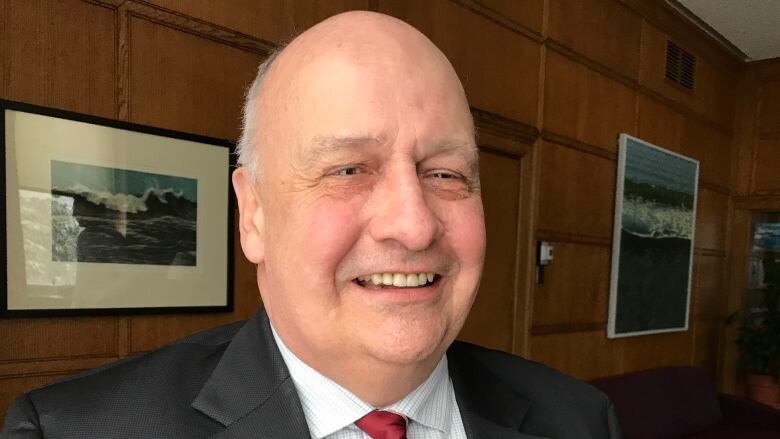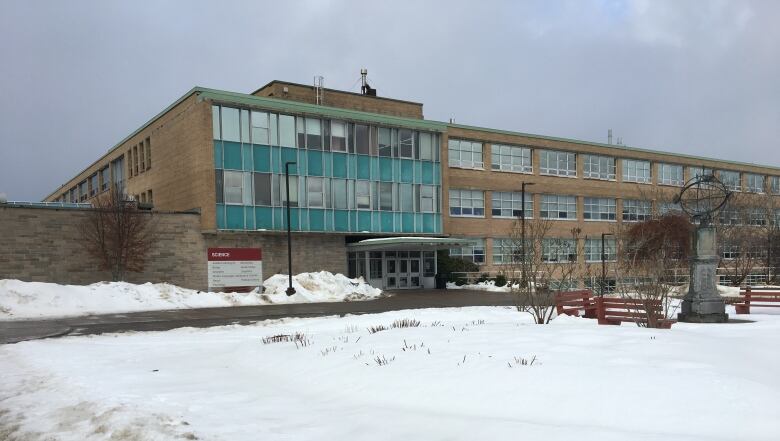Outgoing MUN president says university can cut only so much until core programs affected
Gary Kachanoski says provincial government has asked MUN to save $2.7M each year for the next 2 years

Memorial University's outgoing president wants the provincial government to recalculate planned cuts to the post-secondary institution's budget.
Gary Kachanoski told CBC News on Wednesday the Department of Advanced Education, in a letter last week, outlined a need for more belt-tightening at MUN and asked the university to find additional savings of $2.7 million per year for the next two years.
"It's disappointing because we've had four years of continuous budget cuts already, over the last four years, totalling significant dollars, and we're in the middle of a post-secondary review process which was to look at sustainability and sort of a budget structure around that," Kachanoski said.
In a letter to Memorial University, said the president, the provincial government outlined aneed forthe post-secondary institution to continue to save money, despite the previous four straight yearsof budget cuts.
Kachanoski believes the department got the figures wrong, and said MUN is asking the provincialgovernment to recalculation. MUNbelieves the $2.7-million figure was arrived at through the university'sconsolidated budget, which includes research revenue for specific purposes from the federal government, as opposed to the provincialbudget.
He said the figureshould be about $1.4 million per year for two years, and added there will be discussions between both sides up until the province draws up itsbudget, generally released in the spring.
Balancing act
MUN's tuition freeze is acomplicated conversation whenever the university's budget is under discussion, said Kachanoski.
The school's board of regents is responsible forsettingtuition, but that conversation goes through the provincial government. In previous years, according to Kachanoski, the provincial government would offer MUN cash in lieu of a tuition hike to make up for potentiallost revenue.
Kachanoski said the universityalso has a deferred maintenance gap; he said MUN spends about $7 million a year on maintaining its infrastructure but should be spending $23 million to $24 million.
"I think revenue generation is going to have to bepart of the solution of finding how we're going to deal with,particularly, the infrastructure issue," he said.

But revenue generation in the form of atuition hike wouldcause further problems, especially for students, he acknowledged.
"It gets pretty late in March and April to be talking about imposing a tuition increase on students in the immediate September in the budget year that's coming,"Kachanoski.
"Students have already been accepted under existing tuition proposals," he said. "Your budget solution, even on the tuition side, would have to be phased in, and so that would have to be planned as well."
Smaller budget
According to Kachanoski the university is operating on a smaller budget than it was when he was appointed president in 2010. However, even with a smaller budget, MUN is still able to pay the bills, he said.
Things will continue to tighten on the fiscal front in the coming months, with some MUN faculty and staff set to hit the bargaining table for its next collective agreement. The current agreement endsApril 1.
Kachanoskisaid if staff and faculty are brought up to be on par with the rest of the public sector, that would add $12 million a year in salary to the school's budget, on top ofthe roughly $5.4 million the provincial government is asking it to save.
The president said MUN's salaries are on the modest side, including his ownseverance package,compared with other universitiesacross Canadabutkeep MUN competitive enough toluretop-end researchers to the institution.
For now, the university has been able to save roughly $5.8 million this year because of a voluntaryearly retirement program and permanent reduction in faculty and staff.
"But there is a limit to what you can do with efficiency before you have to start changing core programs, and of course that was the purpose of the post-secondary review: to ask the question of what kind of university does Newfoundland need, and want and deserve,"Kachanoskisaid.
"We belive that it should be a national-classcomprehensive teaching [and] research university like the flagship institutionsavailable in every other province, and to do that there's a certain amount of resources that are needed to deliver that."
In a statement to CBC News the provincial government said, "We won't speak to specifics of any changes contemplated as part of the budget process at this point. The Minister will be happy to speak to specifics once the provincial budget is delivered in the coming months."
With files from Terry Roberts












_(720p).jpg)


 OFFICIAL HD MUSIC VIDEO.jpg)
.jpg)



























































































